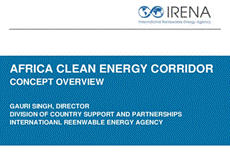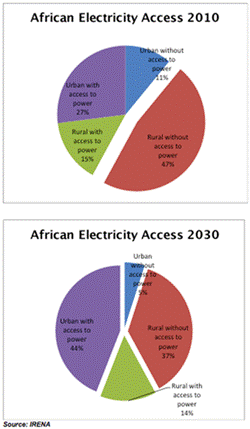|
"More than a century
after the light bulb was invented most of the African continent is still in the
dark after nightfall. School children often cannot read after dusk, businesses
cannot grow, and clinics cannot refrigerate medicine or vaccines, and
industries are idled hampering economic growth, jobs, and livelihoods.

Today some 25 countries in
sub-Saharan Africa are facing a crisis evidenced by rolling blackouts. Although
the African continent is well endowed both with fossil fuels and renewable
resources, these are not evenly distributed, creating windfall profits for some
countries and exacerbating the crisis in others." From World Bank Fact Sheet.

Africa is the least developed continent, and only 24% of
the people in Sub-Saharan Africa have access to basic electrical power. Yet the
untapped potential of renewables energies is one of the highest of any
continent.
Now, the International
Renewable Energy Agency (IRENA) has launched collaboration between 19 East
African states to develop the Africa Clean Energy Corridor. The goal
is to leap frog the fossil fuel path and utilize renewable energies to meet the
growing demand.
Those fortunate enough to
have power still experience poor reliability and high costs ($0.13/kwh)
compared to western standards ($0.04-$0.08/kwh).
We
are privileged by birth. Those born in Africa were not so lucky. The United
Nations IRENA is a powerful new force to assist these nations in their transition
from the Dark Continent to the light. Cooperation among 19 nations will
accelerate their mutual goals and benefits. They deserve all of our support.
In Partnership for the Planet,
|




